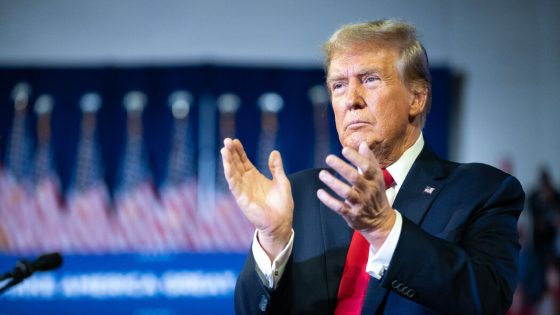After Donald J. Trump suggested he had threatened to encourage Russia to attack “delinquent” NATO allies, the response among many Republican officials has struck three themes — expressions of support, gaze aversion or even cheerful indifference.
Republican Party elites have become so practiced at deflecting even Mr. Trump’s most outrageous statements that they quickly batted this one away. Mr. Trump, the party’s likely presidential nominee, had claimed at a Saturday rally in South Carolina that he once threatened a NATO government to meet its financial commitments — or else he would encourage Russia to “do whatever the hell they want” to that country.
In a phone interview on Sunday, Senator Lindsey Graham of South Carolina seemed surprised to even be asked about Mr. Trump’s remark.
“Give me a break — I mean, it’s Trump,” Mr. Graham said. “All I can say is while Trump was president nobody invaded anybody. I think the point here is to, in his way, to get people to pay.”
Senator Marco Rubio, the Republican Party’s top-ranking official on the Senate Intelligence Committee, struck a matter-of-fact tone as he explained on CNN on Sunday why he was not bothered in the least.
“He told the story about how he used leverage to get people to step up to the plate and become more active in NATO,” Mr. Rubio said on “State of the Union,” rationalizing and sanitizing Mr. Trump’s comments as just a more colorful version of what other U.S. presidents have done in urging NATO members to spend more on their own defense. “I have zero concern, because he’s been president before. I know exactly what he has done and will do with the NATO alliance. But there has to be an alliance. It’s not America’s defense with a bunch of small junior partners.”
Mr. Trump’s comments from the rally stage were not part of his teleprompter remarks, according to a person close to him who was not authorized to discuss the matter publicly. But the remark — a new version of a story he has been telling for years — quickly inflamed in Europe what were already severe doubts about Mr. Trump’s commitment to NATO’s collective-defense provision. That provision, known as Article 5, states that an armed attack on any member “shall be considered an attack against them all.”
Mr. Trump has been using his power over the G.O.P. to try to kill recent bipartisan efforts on Capitol Hill to send Ukraine more weapons and vital resources for its fight against Russia. Ukraine is not a NATO member, but helping Ukraine preserve its independence has become the alliance’s defining mission since President Vladimir V. Putin of Russia began his military invasion in February 2022. And where Mr. Trump might land on a commitment to Ukraine has, for the international community and foreign-policy experts, become something of a stand-in for how he will approach NATO, America’s most important military alliance, in any potential second term.
Officials from smaller and more vulnerable NATO countries are especially worried because Mr. Trump has already suggested that it’s not in America’s national interest to get in a war with Russia to defend a tiny nation like, say, Montenegro.
The international reaction to Mr. Trump’s Saturday remarks included a rare public rebuke from Jens Stoltenberg, the NATO secretary general. Mr. Stoltenberg said that “any suggestion that allies will not defend each other undermines all of our security, including that of the U.S., and puts American and European soldiers at increased risk.”
The defense of Mr. Trump by several Republican officials such as Mr. Graham reflected the trajectory of a party that the former president has largely bent to his will.
Eight years ago, when Mr. Trump was in the thick of his first campaign for president, Mr. Graham would have given a very different response. In that campaign, Mr. Graham — initially one of Mr. Trump’s competitors in the primary, whom Mr. Trump quickly vanquished — saw himself as a defender of the Republican Party’s internationalist values against what he perceived as the acute threat of Mr. Trump’s isolationism.
As a wingman of the late Republican hawk and war hero Senator John McCain of Arizona, Mr. Graham traveled the country warning anyone who would listen about the dangers of Mr. Trump. But after Mr. Trump won the presidency, Mr. Graham set about becoming a friend and close adviser and was welcomed into Mr. Trump’s inner circle. Many others followed a similar path.
In 2016, Mr. Rubio, another foreign policy hawk who competed against Mr. Trump for the party’s nomination, called Mr. Trump a “con man” and warned how dangerous he would be if entrusted with the nation’s nuclear codes. But after Mr. Trump won, he put those feelings aside, became friendly with Mr. Trump and is now among a handful of Republicans in contention to be his running mate.
Senator Tom Cotton of Arkansas, among the most hawkish Republicans on national defense, suggested European nations in the alliance needed to do more to sustain their own defenses against Russian incursions.
“NATO countries that don’t spend enough on defense, like Germany, are already encouraging Russian aggression and President Trump is simply ringing the warning bell,” Mr. Cotton said in an interview. “Strength, not weakness, deters aggression. Russia invaded Ukraine twice under Barack Obama and Joe Biden, but not under Donald Trump.”
Several former national security and foreign policy officials in the Trump administration declined to speak about the anecdote that Mr. Trump told about threatening a NATO member nation’s head of state with encouraging Russian aggression. But they said they recalled no such meeting actually taking place.
Mr. Trump is fond of outright falsehoods in relaying stories to make himself look like a tough negotiator. His former national security adviser John Bolton, who has warned that Mr. Trump would withdraw the U.S. from NATO in a second term, said he had never heard Mr. Trump threaten another country’s leader that he would encourage a Russian invasion.
Another former official, who spoke on the condition of anonymity to avoid inflaming Mr. Trump, delicately described the tale as “hyperbole.” Still another former official — H.R. McMaster, Mr. Trump’s second national security adviser and a retired Army lieutenant general — gave a one-word assessment of Mr. Trump’s comments: “Irresponsible.”
Mr. Trump often praises Mr. Putin — he has described the invasion of Ukraine as the work of a “genius” — and has long admired him as a “strong” leader.
During the 2016 campaign, Mr. Trump called on Russia to “find” emails that Hillary Clinton, then the Democratic nominee for president and a target of Mr. Putin, had deleted from her private email server. He has suggested Mr. Putin is no different, morally, from American leaders. When Bill O’Reilly, a former Fox News host, pressed Mr. Trump shortly after he took office on his admiration for Mr. Putin, saying that the Russian leader “is a killer,” Mr. Trump replied, “What, you think our country’s so innocent?”
But as president, Mr. Trump’s policies toward Russia were sometimes tougher than his predecessor’s — a point that Mr. Trump’s allies highlight when they dismiss statements such as Saturday’s as rhetorical flourishes. Mr. Trump’s allies, who claim he would not undermine NATO in a second term, point out that in his first term he approved sending antitank weapons to Ukraine, which President Obama had not done after Russia seized Crimea in 2014.
As he runs to take back the White House — and as polls suggest he has a good chance of doing so — Mr. Trump has been coy about his intentions for NATO. His campaign website contains a single cryptic sentence: “We have to finish the process we began under my administration of fundamentally re-evaluating NATO’s purpose and NATO’s mission.”
When pressed on what that means, Mr. Trump and his team have refused to elaborate.
Mr. Trump has been focused in private conversations about treating foreign aid as loans, something he has posted about on social media, as Senate Republicans tried again on Sunday to pass an aid package, after Mr. Trump helped tank their earlier efforts. But the Russia comment appeared to catch most on his team by surprise.
Jason Miller, a senior adviser to Mr. Trump’s campaign, when asked to explain the former president’s statements — including whether it was an invitation for new aggression from Russia — did not directly address the question.
“Democrat and media pearl-clutchers seem to have forgotten that we had four years of peace and prosperity under President Trump, but Europe saw death and destruction under Obama-Biden and now more death and destruction under Biden,” Mr. Miller said. “President Trump got our allies to increase their NATO spending by demanding they pay up, but Joe Biden went back to letting them take advantage of the American taxpayer. When you don’t pay your defense spending, you can’t be surprised that you get more war.”
NATO countries’ spending on their own defense grew during the Trump administration, but it has expanded by an even larger amount during the Biden administration, after Russia invaded Ukraine.
Keith Kellogg, a retired lieutenant general who worked in the Trump administration, has remained close to Mr. Trump and who has also been outspoken on the need to defend Ukraine, spoke at the request of the Trump campaign, saying that he did not believe Mr. Trump was opening the door to fresh aggression.
Mr. Trump, Mr. Kellogg said, has a “track record of deterrence.”
He added, “I really do think he’s onto something,” saying that he believes Mr. Trump’s goal is to get NATO members to focus on Article 3 of NATO’s founding treaty, which calls on nations to build their individual and collective abilities to stave off an armed attack.
“I don’t think it’s encouragement at all,” Mr. Kellogg said, because “we know what he means when he says it.”
Source Agencies


